
-
Find the right food for your petTake this quiz to see which food may be the best for your furry friend.Find the right food for your petTake this quiz to see which food may be the best for your furry friend.Featured products
 Adult Perfect Digestion Salmon, Whole Oats, and Brown Rice Recipe Dog Food
Adult Perfect Digestion Salmon, Whole Oats, and Brown Rice Recipe Dog FoodScience Diet's breakthrough nutrition supports ultimate digestive well-being & healthy microbiome
Shop Now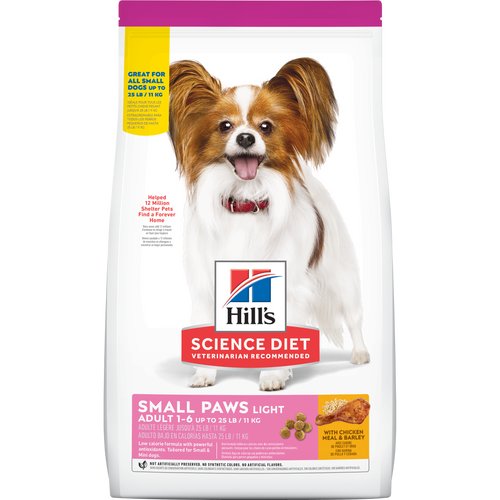 Adult Light Small Paws with Chicken Meal & Barley Dog Food
Adult Light Small Paws with Chicken Meal & Barley Dog FoodLow calories for less active small & mini dogs
Shop Now Hill's Science Diet Adult Oral Care Chicken, Brown Rice & Barley Recipe Dog Food
Hill's Science Diet Adult Oral Care Chicken, Brown Rice & Barley Recipe Dog FoodClinically proven kibble technology to reduce plaque & tartar build-up
Shop NowFeatured products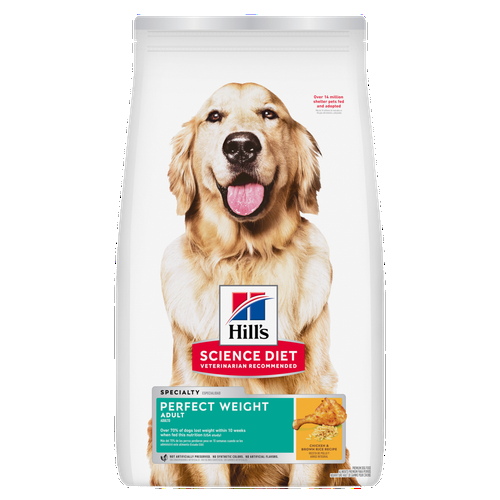 Adult Perfect Weight Chicken Recipe Dog Food
Adult Perfect Weight Chicken Recipe Dog FoodOver 70% of dogs lost weight within 10 weeks when fed this nutrition (USA Study)
Shop Now Adult 7+ Chicken Recipe cat food
Adult 7+ Chicken Recipe cat foodSupports energy level and beautiful fur in mature cats
Shop Now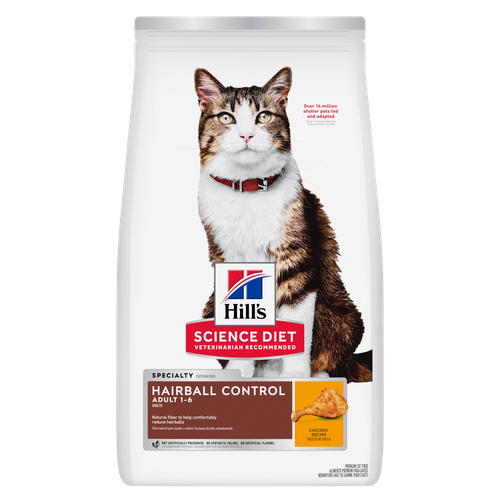 Adult Hairball Control Chicken Recipe Cat Food
Adult Hairball Control Chicken Recipe Cat FoodNatural fiber to help comfortably reduce hairballs
Shop Now -
Dog
- Dog Tips & Articles
-
Health Category
- Weight
- Food & Environmental Sensitivities
- Urinary
- Digestive
- Joint
- Kidney
-
Life Stage
- Puppy Nutrition
- Adult Nutrition
- Senior Nutrition
Cat- Cat Tips & Articles
-
Health Category
- Weight
- Skin & Food Sensitivities
- Urinary
- Digestive
- Kidney
-
Life Stage
- Kitten Nutrition
- Adult Nutrition
Featured articles How to Reduce Your Pet's Carbon Paw Print
How to Reduce Your Pet's Carbon Paw PrintHeaded outside? How you and your pets engage with nature can affect the environment, so here are some quick tips for reducing your pet's carbon paw print.
Read More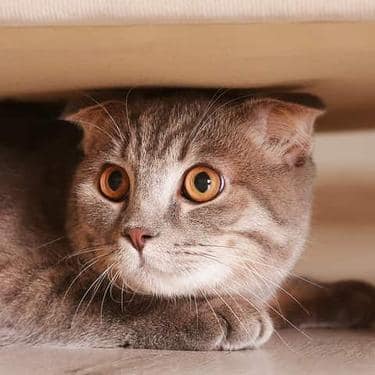 Keeping Pets Calm During Thunderstorms
Keeping Pets Calm During ThunderstormsIs your dog scared of thunder? Does your kitty dart under the bed at the first rumble? Learn a few tips for keeping your pets calm during the storm.
Read More Moving With a Pet: A How-To Guide
Moving With a Pet: A How-To GuideDiscover helpful tips for moving with your pet including safety recommendations to keep in mind on moving day & pet behavior to watch for at your new home.
Read More -


Feeding your cat properly is critical during pregnancy and nursing. Malnutrition can result in low birth weight of the kittens and put them at risk for several health conditions resulting in a reduced survival rate.1 The goal is optimal nourishment for both the mother and her kittens. Specifically, here are nutritional priorities:
- Increased energy from calories for the growth of kittens and milk production for the mother
- Increased protein for growth and development of the kittens
- Increased fat to meet the high demand for calories of the mother
- Increased calcium and phosphorus for bone growth of kittens and milk production of their mother
- High digestibility to provide more calories in a smaller amount of food
Key questions and answers about pregnancy and nutritional priorities.
Why are increased energy and fat so important?
Increased energy and fat are important because pregnant and nursing cats have extremely high energy needs. Nursing is the most energy-demanding stage of a cat’s life. Nursing cats have 2 to 6 times the energy requirements of a healthy adult cat.
What is digestibility and why is it important?
Digestibility is how much eaten food is actually absorbed by the cat’s body. High digestibility is important because energy needs are very high and there is less physical space in the abdomen of pregnant cats.
What should I feed my pregnant or nursing cat?
It is extremely important to feed your pregnant or nursing cat a food that provides the increased nutrition she needs. We recommend feeding Hill’s® Science Diet® Kitten Food formulas as soon as you discover your cat is pregnant. These formulas are rich in essential nutrients and support development of the kittens during pregnancy. It’s always best to talk to your veterinarian about a food recommendation for your pregnant or nursing cat.
What Science Diet® products are available for pregnant or ,nursing cats?
How should these foods be fed to pregnant or nursing cats?
- Pregnant cats: Feed the suggested amount on the packaging. Continue to feed a kitten food to the mother until her kittens are weaned.
- Nursing cats: Leave food available for the mother at all times after the kittens are born. This will ultimately help to wean the kittens to a regular food and provide the mother with high-energy food she will need during this time.
How long is a cat pregnant?
Typical gestation (pregnancy) averages 63-65 days. 2 We recommend that you see a veterinarian weekly during pregnancy and nursing to assess weight and food intake. Please speak with your veterinarian to determine how often your cat should be examined during pregnancy and after the birth of her kittens.


Tasty Tips
When do I wean my kittens?
Weaning is usually a gradual process. Most kittens begin eating solid food between 3-4 weeks of age. Weaning should be effectively completed between 6-10 weeks of age. 3
Initial kitten care priorities.
It is recommended that your keep a record of your kitten’s weight, stools, development and activity every 1 or 2 days (especially in the first two weeks after birth) 4 and schedule a check-up with your veterinarian.
- 1 Small Animal Clinical Nutrition, 4th Edition. Reproducing Cats; Pregnancy p. 321
- 2 Small Animal Clinical Nutrition, 4th Edition. Reproducing Cats; Assessment p. 321
- 3 Small Animal Clinical Nutrition, 4th Edition. Reproducing Cats; Weaning; p. 328
- 4 Small Animal Clinical Nutrition, 4th Edition. Growing Kittens; p.329


One of our staff authors prepared this article for you
Related products

Natural fiber to help comfortably reduce hairballs
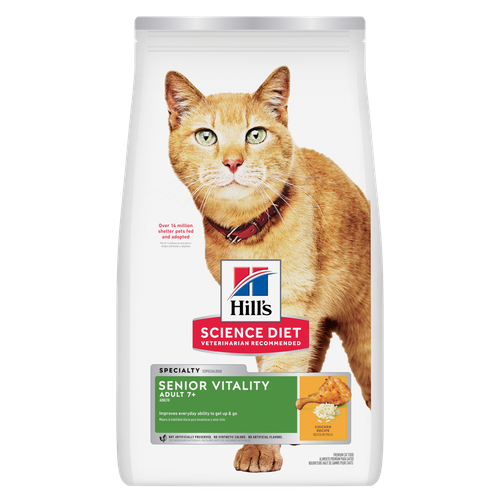
Improves Everyday Ability to Get Up & Go

Supports energy level and beautiful fur in mature cats

Over 70% of dogs lost weight within 10 weeks when fed this nutrition (USA Study)
Related articles
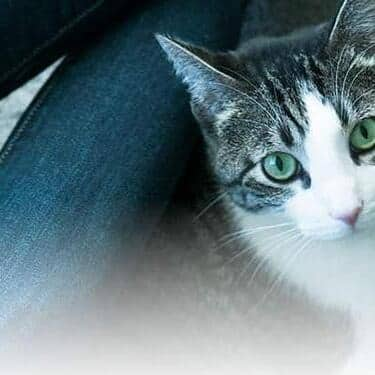
Brushing your cat's teeth is just as important as brushing your own. Learn signs or oral health problems in your cat and how to avoid them.

What is the best food for an overweight cat? Learn all about weight control food for cats, including what's in it and how it works.
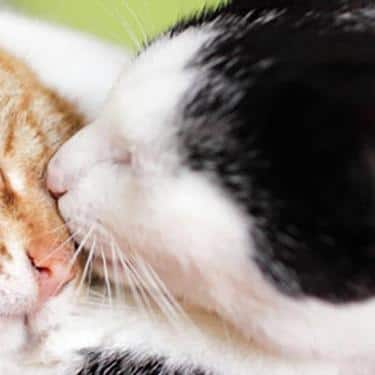
Learn the different factors that might be contributing to your cat's weight gain, and how bigger doesn't always mean better.

Discover how to identify cat sensitive skin and what you can do to help your cat thrive from head to paw.

Put your cat on a diet without them knowing
Our low calorie formula helps you control your cat's weight. It's packed with high-quality protein for building lean muscles, and made with purposeful ingredients for a flavorful, nutritious meal. Clinically proven antioxidants, Vitamin C+E, help promote a healthy immune system.
Put your cat on a diet without them knowing
Our low calorie formula helps you control your cat's weight. It's packed with high-quality protein for building lean muscles, and made with purposeful ingredients for a flavorful, nutritious meal. Clinically proven antioxidants, Vitamin C+E, help promote a healthy immune system.

